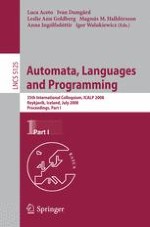2008 | OriginalPaper | Buchkapitel
Finding Optimal Flows Efficiently
verfasst von : Mehdi Mhalla, Simon Perdrix
Erschienen in: Automata, Languages and Programming
Verlag: Springer Berlin Heidelberg
Aktivieren Sie unsere intelligente Suche, um passende Fachinhalte oder Patente zu finden.
Wählen Sie Textabschnitte aus um mit Künstlicher Intelligenz passenden Patente zu finden. powered by
Markieren Sie Textabschnitte, um KI-gestützt weitere passende Inhalte zu finden. powered by
Among the models of quantum computation, the One-way Quantum Computer [11,12] is one of the most promising proposals of physical realisation [13], and opens new perspectives for parallelisation by taking advantage of quantum entanglement [2]. Since a One-way QC is based on quantum measurement, which is a fundamentally nondeterministic evolution, a sufficient condition of global determinism has been introduced in [4] as the existence of a
causal flow
in a graph that underlies the computation. A
O
(
n
3
)-algorithm has been introduced [6] for finding such a causal flow when the numbers of output and input vertices in the graph are equal, otherwise no polynomial time algorithm was known for deciding whether a graph has a causal flow or not. Our main contribution is to introduce a
O
(
m
)-algorithm for finding a causal flow (where
m
is the number of edges of the graph), if any, whatever the numbers of input and output vertices are. This answers the open question stated by Danos and Kashefi [4] and by de Beaudrap [6]. Moreover, we prove that our algorithm produces a flow of minimal depth.
Whereas the existence of a causal flow is a sufficient condition for determinism, it is not a necessary condition. A weaker version of the causal flow, called
gflow
(generalised flow) has been introduced in [3] and has been proved to be a necessary and sufficient condition for a family of deterministic computations. Moreover the depth of the quantum computation is upper bounded by the depth of the gflow. However the existence of a polynomial time algorithm that finds a gflow has been stated as an open question in [3]. In this paper we answer this positively with a polynomial time algorithm that outputs an optimal gflow of a given graph and thus finds an optimal correction strategy to the nondeterministic evolution due to measurements.
